
Over 50 participants in the project Final Conference
The partners shared their experience en el project and described their achievements
Even if 90% of future global growth will happen outside Europe’s borders, few small businesses in Europe export beyond the EU. Increasing the internationalisation of SMEs and helping them access third markets is crucial for Europe Competitiviness.
In this context, Inside Out EU addresses the problems SMEs face when going international and will help them overcome these challenges reinforcing the so called virtuous triangle “collaboration-innovation-internationalisation”.
Every region will build a wider network involving key agents in order to join and be part of the regional learning process.
These networks are expected to contribute to the design of an Action Plan in every region which will be used to improve the regional policies addressing internationalisation, most of them included in the ERDF Operational Programmes.
€1,469,435.00
SME competitiveness
The ERDF Operational Programme for Navarra includes 2 measures for driving small companies to go international in the funding priority 3.4.”Enhance SMEs competitiveness and internationalisation to grow in regional, national and international markets”:
-Support to SMEs with specialized consultancy services for the internationalisation. Subsidies for hiring legal, commercial, administrative and fiscal advice and assistance.
-Support to establish partnerships to go international. Subsidies addressing co-working, co-innovation and co-internationalisation of SMEs.
Why to improve?
-In order to arise awareness of current support as very few EU SMEs actually use public measures. The internationalisation programmes should attract as many SMEs as possible, putting special attention on micro and small enterprises.
-To boost our SMEs competitiveness and growth by reinforcing existing activities supporting them to establish international business partnerships.
-To enhance internationalisation through innovation and cooperation: more innovative SMEs are more active in internationalisation. Due to the small size of the companies addressed by the policy the cooperation is highly recommendable in order to be more competitive.
After the elections in 2015, Province Overijssel decided to develop and implement a new Economic Strategy in the territory. This new approach involves the revision of the existing Smart Specialization Strategy in order to adequate it to the current economic situation. This revision implies developing the measures already adopted as well as incorporating new ones to achieve the RIS3 objectives. The RIS3 sectors of Province Overijssel are High Tec systems and materials, Agrofood, Energy and Health. Internationalisation of SME’s, especially in the RIS3 sectors, is an important issue to be tackled during the modification process. SMEs with an international action plan are more active in markets, are better job providers and keep their balance in crisis situation. Taking into account that the more innovative the SME are the more active they are in internationalisation and that in the RIS3 to be modified, internationalisation policies are not mentioned, the inclusion of a better support to SMEs access external market will strengthen competences in RIS3 sectors and, therefore, improve the policy instrument. We would like to develop this theme further by cooperating with other regions. As most of the companies addressed by the policy are small and micro, there is a need to collaborate to be more competitive and this project could be a helpful way to connect SMEs and other key agents to increase the internationalisation among SMEs through a collaborative process.
Hedmark County Council approved a new International Strategy 2015-2020 in October 2015 following up the Regional Development Plan. One of the strategy’s main goals is «A more internationalised business community in Hedmark» which seeks to promote cooperation among business community in Hedmark with foreign partners and improve main business clusters market position internationally in 2020.
The sub-objective II, «Internationalization and Increased R&I in Hedmark», action point «Strengthening Internationalisation of SMEs» is directly related to Inside Out EU project. The strategy highlights collaboration, networking and clustering among SMEs as a key fact for internationalisation. The strategy will be implemented through several financial instruments in order to increase R&I and competitiveness among SMEs in general and internationalisation of SMEs in particular. The focus on internationalisation of SMEs is strongly prioritized in the region’s policy, therefore we would like to boost this priority further by learning from other regions how to increase internationalisation among SMEs and how to encourage SMEs to connect and collaborate as to explore new markets for their products or services.
In order to reach these goals the policy instrument needs to improve:
I) Measures and funding for micro and SMEs with internationalisation potential
II) Measures and funding for supporting clustering, international marked orientation strategies and international networking for SMEs.
A main objective of the North Middle Sweden fund is “enhancing the competitiveness of small and medium-sized enterprises”. Good regional conditions for business will strengthen the region's development potential and attractiveness. Increased interaction and cooperation between advisory actors at regional level is needed to better meet the needs of entrepreneurs and increase the efficiency of the system. Collaboration and skilled workforce is crucial for the competitiveness of enterprises. As most of the companies addressed by the policy are SME and micro, there is a need to collaborate in order to be more competitive. There is also a need for the SMEs in North Middle Sweden to engage in innovation processes in order to be more innovative and increase their ability for internationalisation. The more innovative the SME are the more active they are in internationalisation. The new regional OPs are emphasizing the importance to include transnational aspects into the projects. According to the Swedish Agency for Economic and Regional Growth, 15% of the funding will be available to a transnational component. Yet, few national, regional and local actors have experience of international projects or networks from earlier programme periods, funded by the EU. The use of the transnational component in the regional operation funds could be an important first step for international cooperation and an opportunity for SMEs to increase their ability for internationalisation.
The Economic Development and Innovation Programme of Hungary included in the priority ”Improvement of SMEs’ competitiveness” has developed measures for supporting small companies to go international via cooperation:
-Spreading of the competitive entrepreneurial awareness: as the number of SMEs increases, the number of the ones able to internationalise increases. This initiative aims empowering the creation of new SMEs and supporting their establishment in a competitive market through the provision of support for their internationalisation. -Creation of a marketable and cooperative SME sector: supports the cooperation among SMEs through the development of clusters, innovation and establishment of networks that are able to improve the conditions of the SMEs to be on the international market.
Why to improve?
-The costs of entering a new market and the internationalisation process are too high for an average SME. At the same time there is a known lack of collaboration among SMEs, collaboration that could help to share good (and bad) practices and the multiple required expenses.
-If more and higher quality services were available for SMEs, it would improve the options of reaching the international market.
-The increasing of the competitiveness of the SMEs of a region improves the economic development of the region, which is committed to innovation and knowledge-intensive sectors.
The regional economy is characterized by a low internationalization rate and its growth has been ‘fueled’ so far by the demand for consumption from residents and Public Administrations fixed investments. This model of growth did not allow the regional economy to take advantage of the contribution of foreign markets. For this reason, the ERDF O.P. 2014-2020, intervenes on Thematic Objective 3. The TO3 has the goal of supporting SMEs competitiveness and internationalisation trough:
• incentives to purchase support services for internationalisation in SMEs,
• the creation of business opportunity meetings aimed at attracting foreign investment and promoting trade agreements.
To implement an internationalisation support policy -especially in a territorial context of micro and small businesses-, it is strategical not only to have a good incentive system, but also to foster the development of new models that can support internationalisation in a more efficient way. These models have to be aimed at boosting innovation, supply chains collaboration and cooperation/synergies among sectors of specialisation (eg .tourism, agrofood, creativity, in particular design, and culture), as the keys to success competing on foreign markets. The establishment of the Interreg partnership is mainly aimed at the improvement of the policy instrument by the exploitation of best practices from other regions and Countries and the exchange of expertise and views among SMEs as well.
The strategic objective of the ERDF Investment for Growth and Jobs Programme (IGJ) is to promote smart, sustainable & inclusive growth, the achievement of economic, social and territorial cohesion, and high levels of employment and productivity. The Programme’s ultimate aim is to improve NI’s economic growth, with a focus on three key priority areas:
• Strengthening Research, Technological Development & Innovation
• Enhancing the Competitiveness of SME’s
• Supporting the shift towards a Low-Carbon Economy.
Within Priority Axes 1 & 2 there is a focus on:
• Increase NI business expenditure on R&D
• Engage more businesses in R&D
• Increase the number of high growth SME’s in NI
• Increase employment in NI micro and small businesses.
The ultimate aim of the NI Economic Strategy is to improve the economic competitiveness of the NI economy through a focus on export led economic growth. This policy priority requires that there are higher levels of internationalisation & collaboration of SMEs to promote long term sustainable growth. The objective of NI’s exports strategy ‘Export Matters’ is to enable the conditions for increasing external sales and exports in NI which makes a valid contribution to IGJ.
These strategic priorities clearly demonstrate that the internationalisation of a growing private sector is essential to support the local economy and, to achieve this there is a strong focus on driving exports and external sales.

The partners shared their experience en el project and described their achievements

Next 22nd April will take place the Inside Out EU final event
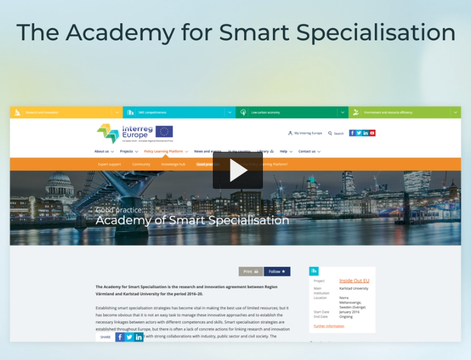
Video presentation of one of the good practices detected in the project, from Karlstad University
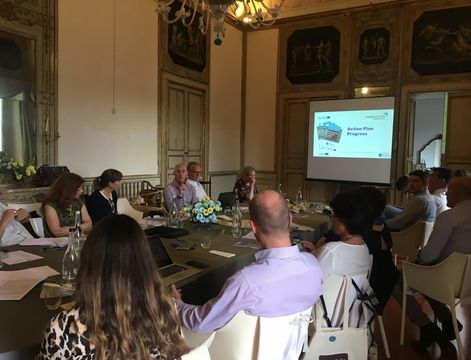
Project partners met in Matera (Basilicata) in order to share their actions for improving policy instruments in phase 2
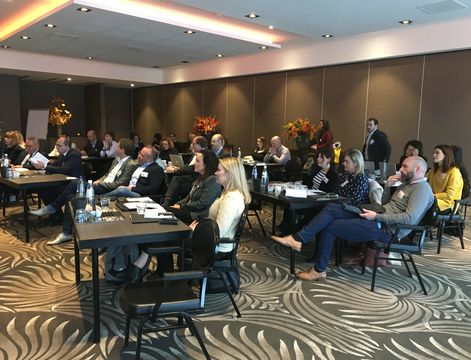
Delegates from the 7 regions taking part in Inside Out EU project met in Zwolle, Overijssel (NL)
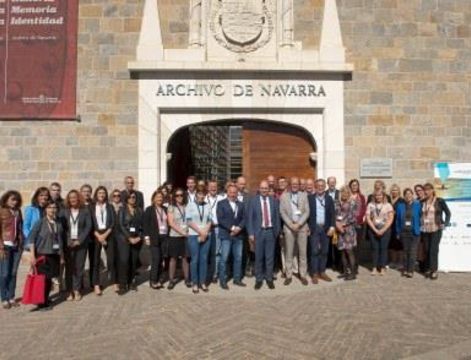
20 representatives from 7 European regions visited Navarre in order to learn about its policies to support the internationalization of SMEs
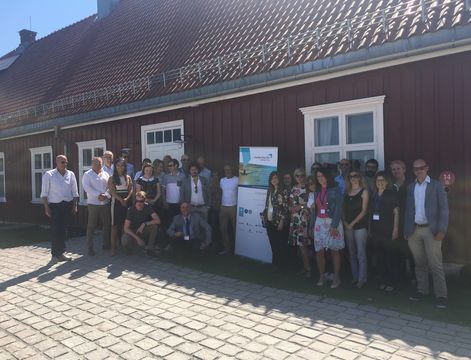
30 delegates from 7 regions met in Kongsvinger to know the internationalization support policies in Province Hedmark (Norway)
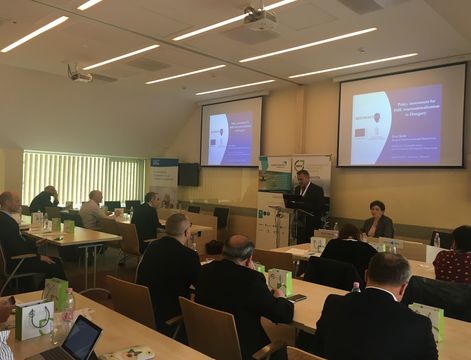
Partners and stakeholder of Inside Out EU project meet in the 4th study visit organized by the Chamber of Commerce and Industry of Hajdú-Bihar County

Delegates from the 7 partner regions visited Northern ireland in order to know the regional internationalisation support policies
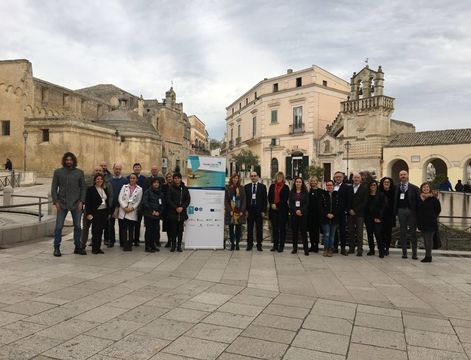
Partners and stakeholders from Inside Out EU project meet 12th and 13th December in Matera (Italia). There, the representat